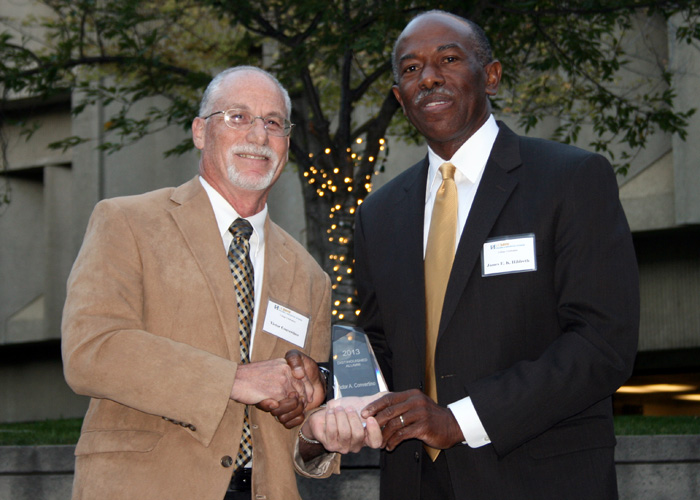Army Researcher Named Outstanding Distinguished Graduate Alumni

A physiologist and researcher from USAMRMC's U.S. Army Institute of Surgical Research received the Outstanding Distinguished Graduate Alumni Award from the University of California, Davis College of Biological Sciences.
Victor A. Convertino, Ph.D., the tactical combat casualty care research task area program manager, accepted the award during a ceremony at Davis, Calif., Oct. 10.
"I am very humbled and honored to have received a career award from an institution that holds national rankings in the top 10 for public universities and in the top 50 in life sciences and medicine research," said Convertino. "But I'm most deeply touched by the respect that I've received by my colleagues. I hold a deep appreciation that no individual recognition accurately reflects a lifetime of support from family, friends, teachers, and colleagues who've made every accomplishment possible. This lifetime team includes the support and contributions of past and present members of the tactical combat casualty care research task area here at the USAISR."
Nomination letters written by Convertino's colleagues to support this award stated that he was instrumental in the development of exercise countermeasures for astronauts and high-performance aircraft pilots with translational application to the care of special populations such as patients who are bed-ridden or wheelchair-restricted.
He was also involved in research that supported the development of advanced technologies for application in military medicine that are designed to optimize combat casualty care by providing early diagnosis and treatment of life-threatening low-tissue perfusion during out-of-hospital care.
Among the several combat casualty care research projects that Convertino has participated in since joining the USAISR in 1998 are the impedance threshold device and compensatory reserve index algorithm. The ITD increases low blood pressure in spontaneously breathing patients and the CRI algorithm utilizes the information obtained from a standard pulse oximeter and gauges whether a patient requires resuscitation or immediate medical attention.
In his acceptance speech, Convertino read an excerpt from an e-mail that he received from the chief of emergency medicine deployed at the 228th Combat Support Hospital in Baghdad, Iraq in June 2007. The note stated that a soldier with a gunshot wound to the pelvis was brought to the emergency room. The patient was in shock with low blood pressure and the medical staff was having problems finding a vein to start an IV. After an injection with a medication to raise the blood pressure failed, the medical staff placed a breathing value (ITD) which raised the blood pressure allowing an IV to get started. The patient was stabilized and sent to the operating room for surgery.
"I couldn't think of anything that better defines the value of an education...," he said. "And the opportunity to serve our Nation's military who defends the freedoms that we enjoy. I'm deeply grateful for such opportunities."
 An official website of the United States government
An official website of the United States government
 ) or https:// means you've safely connected to the .mil website. Share sensitive information only on official, secure websites.
) or https:// means you've safely connected to the .mil website. Share sensitive information only on official, secure websites.


